If you’re feeding your Great Dane all the good stuff, why is he or she still munching on grass? You’re not the only one who feels this way. Among dog-related cultures, this is one of the most often posed questions of veterinarians.
So, why does your Great Dane eat grass? Due to boredom or fear, Great Danes, like every other breed, can always eat grass. Consider emotional explanations behind your dog’s actions whether he or she is not displaying any signs of digestion problems but continues to munch on grass. Your Great Dane can even do so simply to pass the time.
Following some analysis, I came up with a list of potential causes for Great Danes’ actions. To find out more, keep reading. I even put in a few pointers. These tips can assist in maintaining your Great Danes’ health.
Related Topic: Why Does Your Doberman Pinscher Eat Grass?
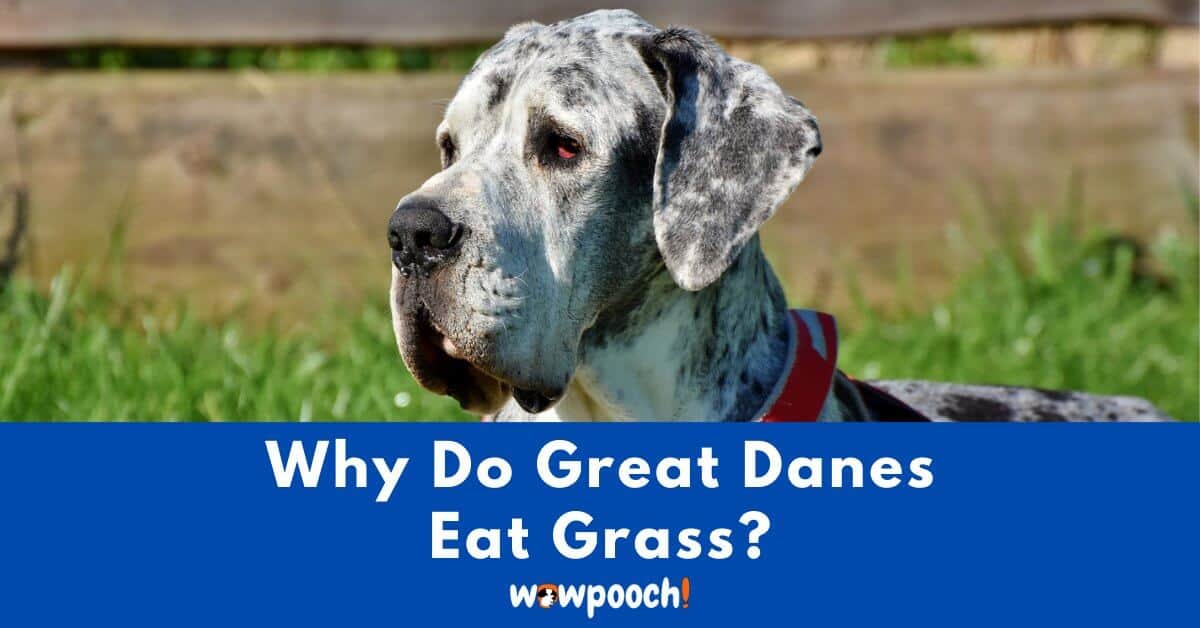
Is Eating Grass Good For Your Great Dane?
Roughage is essential in your Great Dane dog’s diet, and the grass is a good source of fiber. Since your Great Dane dog’s ability to digest food and move stool is harmed by a lack of roughage, grass can make their bodily functions work more smoothly.
However, although eating grass isn’t normally dangerous for your Great Dane dog, it can induce intestinal parasites that can be picked up from animal droppings and stool. It’s also important to realize that herbicides and pesticides used on your lawn will hurt your Great Dane.
Just over a quarter of Great Dane dogs vomit after chewing food, and just about ten percent exhibit symptoms of sickness while eating grass because others aren’t eating it because they’re sick.
Grass intake may mean that your Great Dane dog is trying to calm a disturbed stomach, and some puppies can vomit shortly after consuming it.
Related Reading: Why Do Your Beagle Eat Grass?
4 Main Reasons: Why Does Your Great Dane Eat Grass a Lot?
Your Great Dane dog will also eat grass out of frustration or fear, much as you do when you mindlessly bite your nails. If your Great Dane dog isn’t exhibiting any signs of stomach problems but continues to graze on hay, you should consider psychological factors.
#1 Your Great Dane May Increase Dietary Fiber
Your Great Dane may have a medical condition such as stomach ulcers, immune disorders, or gastritis if they exhibit any signs of stomach problems.
Fiber will be required in the diet of all Great Danes. It’s quite likely that your Great Dane dog is maintaining this desire by chewing grass. Fiber deficiency in your Great Dane’s diet will make it difficult for him to digest food and move stool.
They are also making their bodies perform properly by eating grass.
If your Great Dane is sick or has diarrhea while chewing grass, consult your veterinarian to rule out a possible medical issue.
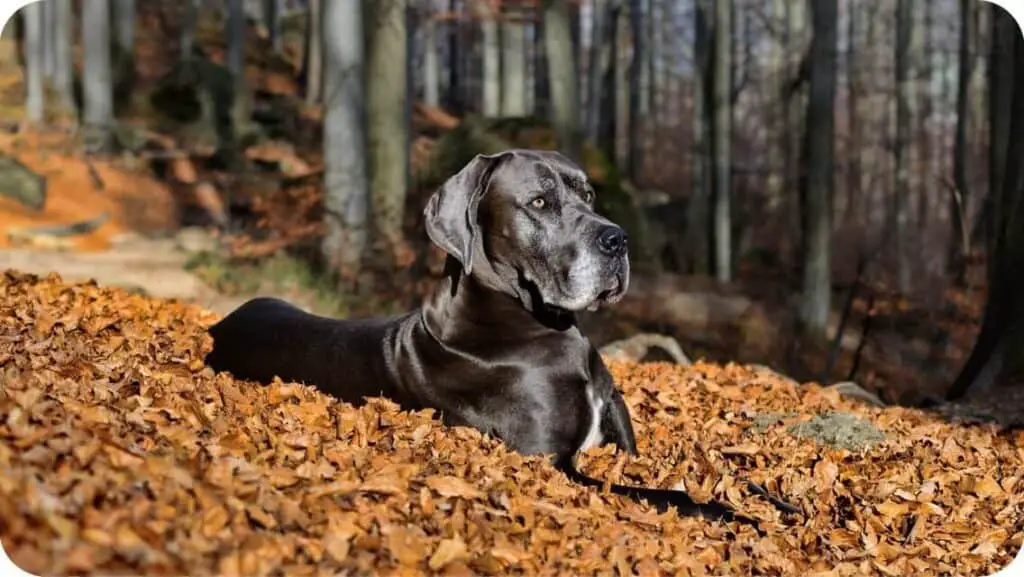
#2 Your Great Dane May An Upset Stomach
The most common explanation for people to believe Great Danes would eat grass is to relieve stomach discomfort. Consuming grass is considered appropriate for dogs who are otherwise stable and take disease prevention drugs daily.
Do your Great Danes, on the other hand, chew grass fast and then vomit?
While most Great Danes do not vomit when they eat food, this is a normal occurrence in dogs that have a disturbed stomach before eating the grass.
Symptoms Of Upset Stomach in your Great Dane
- Vomiting and diarrhea in your Great Dane dog or puppy are typical symptoms of an irritated, upset stomach and intestines, or gastrointestinal distress.
- If your dog has a disturbed stomach, biting lips or licking the air could be a sign.
- If your Great Dane puppy’s stomach is hurt, he will gulp, lose sleep, and become drowsy.
- It’s also a symptom of a weak stomach whether you’re salivating, chewing hay, or licking the cement.
- Flatulence and gurgling sounds from the stomach are also signs of an irritated stomach in your Great Dane.
#3 The Great Dane Canine Needs More Nutritional Supplements
The majority of adult indoor dogs that have been spayed or neutered have reduced energy needs. Your Great Dane dog’s diet should have low-calorie content per cup, preferably less than 350 calories.
If your Great Dane dog food has 500 calories a cup and your dog weighs 20 pounds, the amount you can feed is very small.
Daily, most dogs will need fewer calories, while a few will need marginally more. This daily calorie amount covers the dog’s food as well as any drinks and treats.
Since Great Dane puppies develop so quickly, they need more food than adult dogs. Feeding puppies three to four times a day makes it easy for them to eat their food and helps them sustain their energy levels.
However, don’t overfeed them because overweight puppies are more prone to grow up to be overweight adult pets.
#4 Your Great Dane Pup May Be Bored
Your Great Dane puppy could be chewing grass to keep themselves occupied. This is most common in Great Danes who don’t get enough exercise. Young puppies and dogs have a lot of pent-up energy to expend.
Eating grass is a behavior problem for your bored Great Dane, but it might not be a major problem at all. If the grass chewing does not make the dog ill, you do not need to be concerned. Attempting to remedy this behavior can do more harm than good by interfering with instincts.
Nibbling on easily available grass helps pass the time. If your Great Dane Dog feels neglected, he or she will try to get your attention by acting out inappropriately, such as eating grass.
Related Reading: Why Does Your Greyhound Eat Grass?
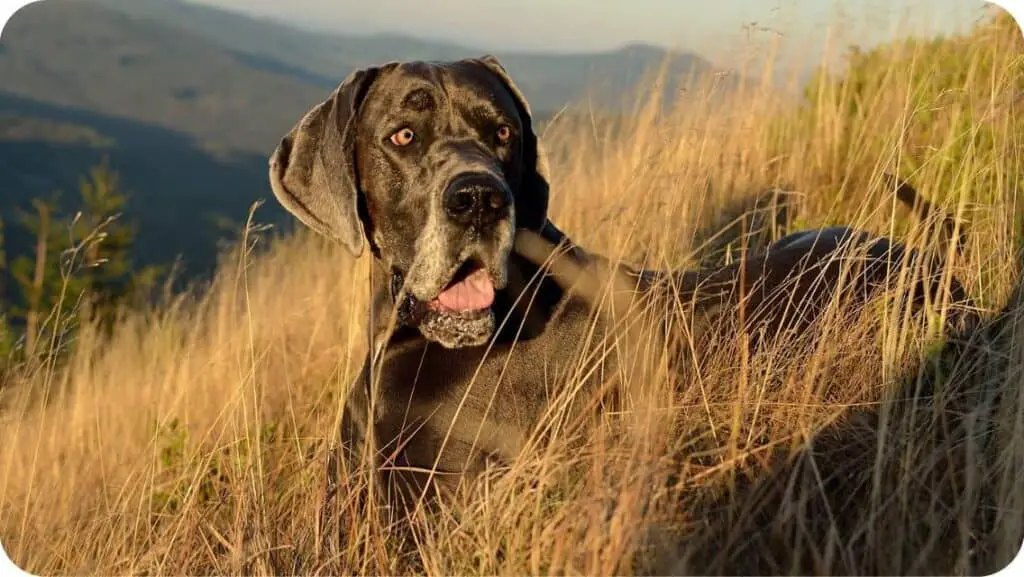
3 Other Reasons: Why Does Your Great Dane Eat Grass?
While many Great Danes seem to like eating grass, the explanation for your Great Dane eating grass might not be entirely obvious. There may be other explanations as well, such as the reasons I have mentioned above.
#5 This Is An Instinctive Behavior Of Your Great Dane Canine
Your Great Dane forefathers did not consume food in sealed bags. In the wild, dogs would eat what they hunted to keep their diet balanced. They ate the meat, bones, internal organs, and stomach contents of their prey, as well as the dairy, limbs, and body parts of their predator.
Eating an entire animal provided a reasonably balanced diet, especially when the prey’s stomach contained grass and plants, which satisfied the dog’s fiber requirement.
Modern dogs, like your Great Dane puppy, do not need to hunt for food, but that does not mean they have lost their natural scavenging instinct.
If the occasional grazing session does not make your dog sick and parasite prevention is provided, you need not be concerned. It’s just their instinct.
#6 Your Great Dane Puppy Is Suffering From Intestinal Worms
Your Great Dane dog may be chewing grass to cure intestinal worms or to meet an unmet food requirement. In your dog’s feces, worms or worm segments appear. Worms in Great Dane dogs can be found in their feces, urine, or on their bottom.
Your Great Dane will exhibit symptoms of fatigue and sadness. Diarrhea or vomiting can be present in your Great Dane. Despite having a healthy appetite, you will find weight loss.
#7 Your Great Dane Dog Likes The Taste Of Grass While Grazing
Your Great Dane might like the taste and feel more comfortable with a mouthful of grass in their cheeks. Let’s say your Great Dane is still in the habit of nibbling on fresh grass in the springtime, and can only eat more in the summer.
Great Dane dogs are excited about putting their mouths on just about anything In some cases, shoes, they’ll go to their hands and knees, and in others, they’ll use the mattress as a tongue depressor, and then eat whatever is on the deck.
Regardless of all the excellent reasons that you have found to explain your Great Dane’s habit of chewing on grass, the most basic excuse is that he only enjoys the flavor. There is a chance that your Great Dane is a food addict.
Should I Worry About My Great Dane Eating Grass? When Should I Take Action?
Eating grass is a natural practice, but your Great Dane won’t benefit from it. There are certain situations you may want to hesitate to put up while attempting to prevent your Great Dane from eating grass.
This is just a handful of the things you would want to get in the way of your Great Dane eating grass. Occasionally, the grass can be polluted with parasites. It is possible that your Great Dane can bring home intestinal parasites such as roundworms or helminth worms if they are allowed to munch on vegetation.
It is essential to maintain parasite control in the long term to keep your Great Dane’s digestive system by having them on a monthly deworming treatment.
Often, various grasses and plants have toxins in them. Keep the Great Dane away from dangerous plants outside and away from harmful vegetation while he is out of the house for long periods to avoid poisoning.
You must take action if your Great Dane falls sick after eating grass or shows any symptoms of sickness as I mentioned above.
Related Reading: Why Do Dogs Eat Grass?
How to Stop Your Great Dane Dog from Eating Grass?
Grass-eating is a common occurrence for your Great Dane dog. But it is food if he is doing it excessively. If you want to stop your Great Dane from eating grass then there are some things you can do to prevent your Great Dane from eating grass:
- When your Great Dane likes to feed, you should coax them to eat. You will need to have food with you for your Great Dane while you take him for walks or to the bathroom.
- Often deter the Great Dane from chewing grass if they try to do so. When they listen, reward them.
- Your Great Dane would give up grass for pets and recognition. Tell the dog to wait and then give them praise as they approach you.
- If you pay the dog any respect, he will leave the grass alone. If you owe your Great Dane ample time, he will love you back.
- Great Dane dogs are energetic canines that need regular exercise. They often need mental activity. Keep your Great Dane sufficiently exercised.
- If your Great Dane is unhealthy, he may be eating grass because of a malabsorption problem.
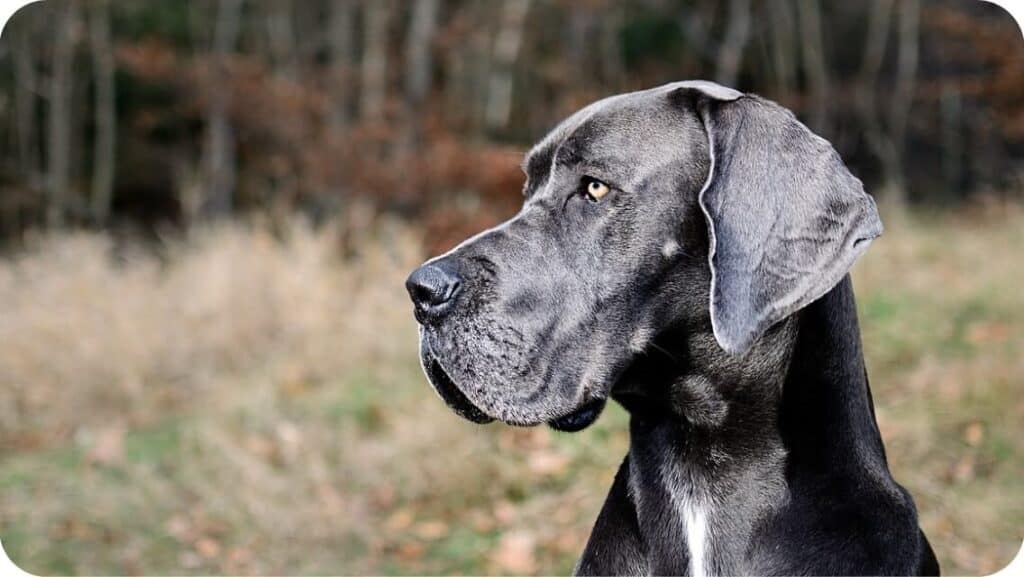
What To Offer To Your Great Dane Fido As A Safe Substitute For Grass?
Grass is a favorite food of Great Dane dogs. So, if you’re looking for a grass replacement for your Great Dane puppy, look for something cool, young, and textured. New broccoli, peeled celery, and even lettuce are often used among pet owners. Discover which foods your Great Dane dog loves.
Clover is safe to feed for Great Danes because it is tougher than grass and less likely to stain. Turf is a low-maintenance, stain-resistant alternative. It also prevents your dog from digging and reduces the need for other types of yard work, such as mowing.
Consult your doctor if your Great Dane tries to eat hay. You may need to switch foods or recommend buying a wheat or oat grass starter pack. Since many people use fertilizer or herbicides on their lawns, including a grass plant for your pet indoors instead of making them graze is a good idea.
Read To Know: Why Do Basset Hounds May Eat Grass?
Related Questions:
Are Great Dane Allergic To Grass?
Grass allergies are unusual in Great Danes and other breeds. Grass allergy, on the other hand, is not uncommon. Watery eyes, noses, and scratchy throats are common in Great Dane dogs that are allergic to grass, although the effects are less severe than in humans.
Can Grass Cause Any Blockage In Your Great Dane’s Digestive System?
Too much grass for Great Dane dogs may trigger intestinal blockage, and grass consumption has been linked to bloat on several occasions. If your pet eats a lot of grass, make an appointment with your veterinarian to rule out any underlying issues.
Why Does Your Great Dane Laying In Grass?
Your Great Dane dog may roll in grass to clear debris from his back, or he may roll in something stinky to hide his odor. Rolling around in the lawn will help your dog loosen soil stuck to his back and self-groom hard-to-reach areas. It can also assist in the elimination of loose fur clumps.
Does Great Dane’s Urine Kill Grass?
Even though your Great Dane puppy is man’s best friend and enjoys your lawn as much as you do, dog pee creates havoc on turf, leaving charred, barren lawn patches or discolored grass in its wake. The excessive level of nitrogen and associated salts naturally found in dog urine triggers dog urine lawn spots.
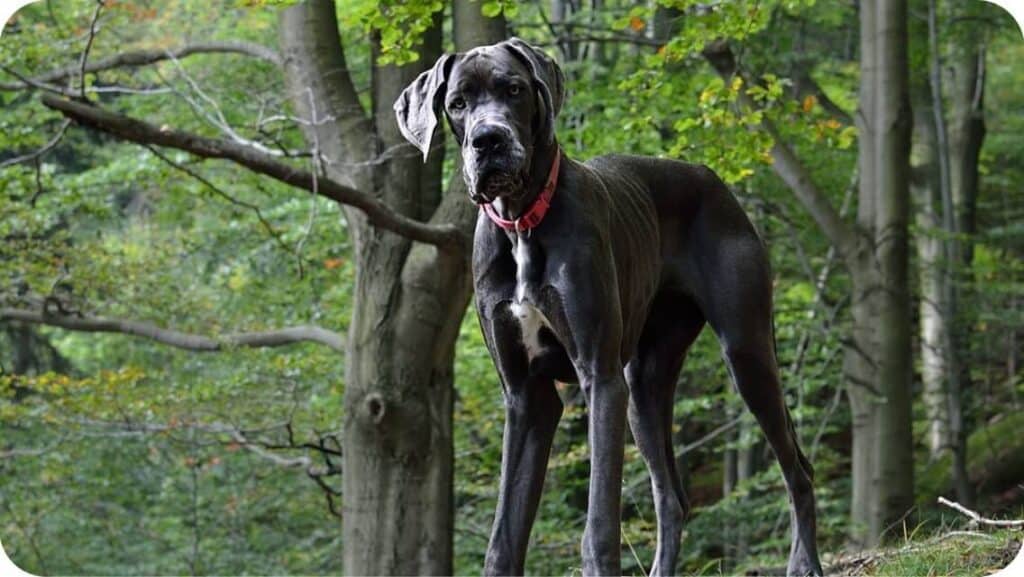
Over To You
It’s not natural for your Great Dane to consume a lot of grass. However, whether he or she just does so on occasion, you shouldn’t be too worried.
I’ve tried to cover anything that could be of use to you in this situation. Tell me which reality was the most beneficial to you, which one you already knew, and which one you didn’t.
If you want to try some of the tricks or if you have already tried some of the tricks listed in this article, please let me know.
Also, please let me know if there’s something I’ve missed, and please share any helpful comments you have on this article.
Please share this post with others if you liked it, and if you have any complaints, please share them in the comments section. Thank you for taking the time to read this.
Further Readings:
Related Topics:
1. How To Identify And Rate Your Dog’s Intelligence?
2. Can Pit Bulls Jump Over Fences?

